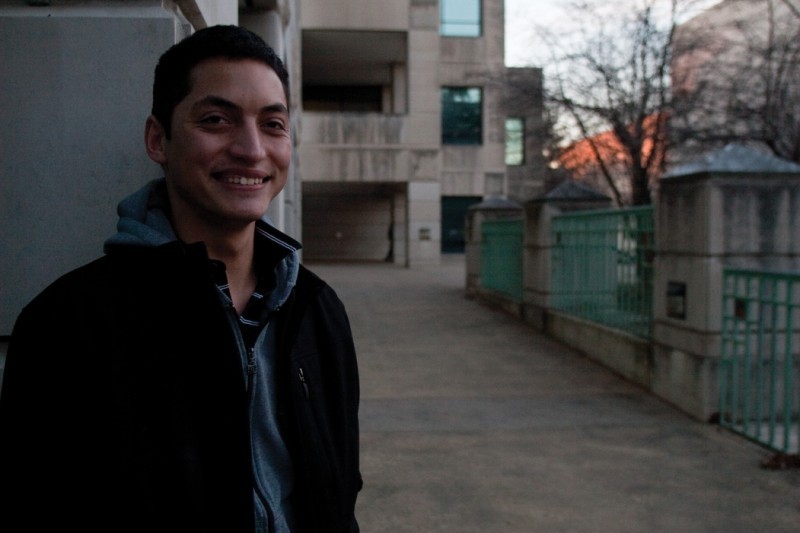Deaf student learns to hear in new ways
December 2, 2010
Juan Luquez is usually the quiet one at the table, to start out with.
Surrounded by friends, he heard only blurred noise as if listening to a bad opera aria. With his head tilted to one side, he attempted to listen with his right ear because his left doesn’t work. They switched from English to Spanish, from Spanish to English. But Luquez stopped listening with his ear. He read lips instead.
Born partially deaf, Luquez, senior in Spanish, can hear 40 percent total with only his right ear.
Luquez, former president of the ISU Spanish Club, grew up in Tucson, Ariz., where he was surrounded by Hispanic culture not only in his home but in school.
Luquez’s speech therapists told his mother to teach him Spanish first because it would make it easier for him to read lips and communicate —there is only one way to say words in Spanish.
Luquez relies on reading lips because he doesn’t like to wear his hearing aid. Everything is so loud that he can hear the person on the other end of a cell phone conversation.
He began to read lips when he was 5 years old. Although he learned sign language, he never used it. No one around him knew how to communicate that way, so Luquez eventually forgot most of what he learned.
Luquez started his schooling at a private school for students with disabilities but hated it and wanted to leave; his mother decided to put him in public school where Luquez did better but still struggled to communicate with his friends and especially his teachers.
“I didn’t understand myself,” Luquez said. “[I didn’t understand] what it is to be a deaf person.”
Luquez was provided with a hearing-impaired teacher in his classes all throughout his schooling until he graduated from high school.
After his family moved from Tucson to Ottumwa, Iowa, his junior year of high school, Luquez began to think about college. His parents were concerned for him and wanted him to go to school in a bigger city where people were more educated about his condition, but Luquez wanted to go to school in Iowa — the people were nicer here.
Luquez’s first semester at Iowa State was a tough one. He couldn’t understand what was going on in any of his classes and wasn’t aware that he could be accommodated for his disability until he met with his adviser again at the end of the semester.
“She was so sorry because she didn’t do something for me at the beginning of the semester, so she sent me to a disability counselor,” he said. “People think I don’t need help because I can talk well. They think it’s a joke.”
Luquez has since struggled with certain professors who are aware of his condition but aren’t always willing to assist him.
“We had to watch videos on the Internet in one of my Spanish classes,” Luquez said. “I told my professor that I couldn’t do it because there wasn’t a caption, but he said try your best because everyone else is doing it. I managed.”
Luquez did better his second semester at Iowa State because he was given notes from professors and copies of movies, but he still struggled.
Disability Student Resources later provided Luquez with someone to type his notes for him during his classes so he wouldn’t miss anything said in the lecture. Luquez said people think he’s an international student and come up with their own assumptions before they ask. He said some professors ask him for copies of his notes because they are so thorough.
Disability Student Resources, where Luquez is also an office assistant, is responsible for coordination of reasonable accommodations that are provided for ISU students, said Steven Moats, director of Student Disability Resources.
“One of our goals is to help create and provide an environment that allows all people with documented disabilities the opportunity to engage in the college experience at [Iowa State],” Moats said.
“Presently, we work with approximately eight students and their instructors to help provide reasonable accommodations. This includes arrangements for interpreting, live or remote captioning of class lectures, labs, dorm floor meetings and tutoring sessions. We also work with instructors and Parks Library staff on use of closed captioned media when shown in classes.”
With his disability, Luquez said that although he encounters obstacles, there are still positive things about his condition — some he has yet to discover. If he wants to ignore someone, he just turns away from them, or if he wants to take a nap in the same room his roommates are partying in, he can without even knowing they’re there.
“People don’t see a person like me everyday,” he said. “I’m still not comfortable with my condition. I want to understand everyone.”







